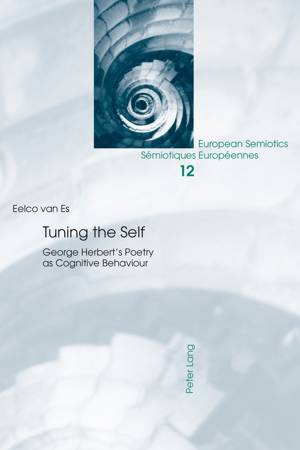
Door een staking bij bpost kan je online bestelling op dit moment iets langer onderweg zijn dan voorzien. Dringend iets nodig? Onze winkels ontvangen jou met open armen!
- Afhalen na 1 uur in een winkel met voorraad
- Gratis thuislevering in België vanaf € 30
- Ruim aanbod met 7 miljoen producten
Door een staking bij bpost kan je online bestelling op dit moment iets langer onderweg zijn dan voorzien. Dringend iets nodig? Onze winkels ontvangen jou met open armen!
- Afhalen na 1 uur in een winkel met voorraad
- Gratis thuislevering in België vanaf € 30
- Ruim aanbod met 7 miljoen producten
Zoeken
Omschrijving
This book provides a cognitive analysis of the poetry of George Herbert (1593- 1633). From Herbert's own thinking, recorded in his prose treatises, can be deduced that his poems should serve a specific function: teaching self-knowledge to his readers. Self-knowledge is a necessary skill, to be applied in one's strife for 'temperance' the regulation of body, house, church, mind, and community. To Herbert, the meaning of his poems is subservient to this function: poetry should aid his readers to temper their lives. The cognitive framework applied here can serve to explain this function. Following Merlin Donald's theory of cognitive evolution, art serves the purpose of mimetic meta-cognition: a specific cognitive strategy at the disposal of a county priest. Moreover, a cognitive framework can serve to explain why the Herbert-tradition has paid so little attention to this artistic function; this tradition operates within specific confines, the same confines that Herbert sought to compensate with his poetry and his thinking.
Specificaties
Betrokkenen
- Auteur(s):
- Uitgeverij:
Inhoud
- Aantal bladzijden:
- 146
- Taal:
- Engels
- Reeks:
- Reeksnummer:
- nr. 12
Eigenschappen
- Productcode (EAN):
- 9783034313780
- Verschijningsdatum:
- 18/07/2013
- Uitvoering:
- Paperback
- Formaat:
- Trade paperback (VS)
- Afmetingen:
- 170 mm x 240 mm
- Gewicht:
- 289 g

Alleen bij Standaard Boekhandel
+ 150 punten op je klantenkaart van Standaard Boekhandel
Beoordelingen
We publiceren alleen reviews die voldoen aan de voorwaarden voor reviews. Bekijk onze voorwaarden voor reviews.











